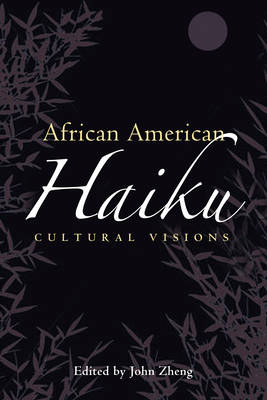
Je cadeautjes zeker op tijd in huis hebben voor de feestdagen? Kom langs in onze winkels en vind het perfecte geschenk!
- Afhalen na 1 uur in een winkel met voorraad
- Gratis thuislevering in België vanaf € 30
- Ruim aanbod met 7 miljoen producten
Je cadeautjes zeker op tijd in huis hebben voor de feestdagen? Kom langs in onze winkels en vind het perfecte geschenk!
- Afhalen na 1 uur in een winkel met voorraad
- Gratis thuislevering in België vanaf € 30
- Ruim aanbod met 7 miljoen producten
Zoeken
African American Haiku
Cultural Visions
€ 110,45
+ 220 punten
Omschrijving
African American Haiku: Cultural Visions offers insights into African American poets' innovations in the haiku form, shedding light on a neglected aspect of black poetry. Notable scholars present new interpretations of well-known works. Essays trace the verse of five major African American haiku poets: Richard Wright, James Emanuel, Etheridge Knight, Sonia Sanchez, and Lenard D. Moore. Sachi Nakachi investigates the influence of Japanese aesthetics and Eastern philosophy on Richard Wright's haiku showing Wright's interest in the blues as poetry. Yoshinobu Hakutani analyzes the vision and affinity of jazz and haiku throughout James Emanuel's Jazz from the Haiku King. And Claude Wilkinson digs into Etheridge Knight's improvisation and adherence to tradition of haiku and African American vernacular form. The collection also explores how Sanchez creates a new American hybrid form of the modern haiku in English by blending haiku with her own principles of a black aesthetic. Toru Kiuchi shows how Lenard D. Moore expresses his experiences through haiku with his African American aesthetics and connections to black southern culture. By discussing multiple writers from a variety of disciplines in a single volume, the essayists compare and contrast the work created by writers, poets, and musicians, and illuminate the variety of methods African American authors used when adapting this traditional Japanese form. The result is a volume that offers rich insight into African American aesthetics, the black arts movement, gender issues, blues and jazz, and trends in contemporary poetry.
Specificaties
Betrokkenen
- Uitgeverij:
Inhoud
- Aantal bladzijden:
- 192
- Taal:
- Engels
- Reeks:
Eigenschappen
- Productcode (EAN):
- 9781496803030
- Verschijningsdatum:
- 10/02/2016
- Uitvoering:
- Hardcover
- Formaat:
- Genaaid
- Afmetingen:
- 152 mm x 229 mm
- Gewicht:
- 494 g

Alleen bij Standaard Boekhandel
+ 220 punten op je klantenkaart van Standaard Boekhandel
Beoordelingen
We publiceren alleen reviews die voldoen aan de voorwaarden voor reviews. Bekijk onze voorwaarden voor reviews.








